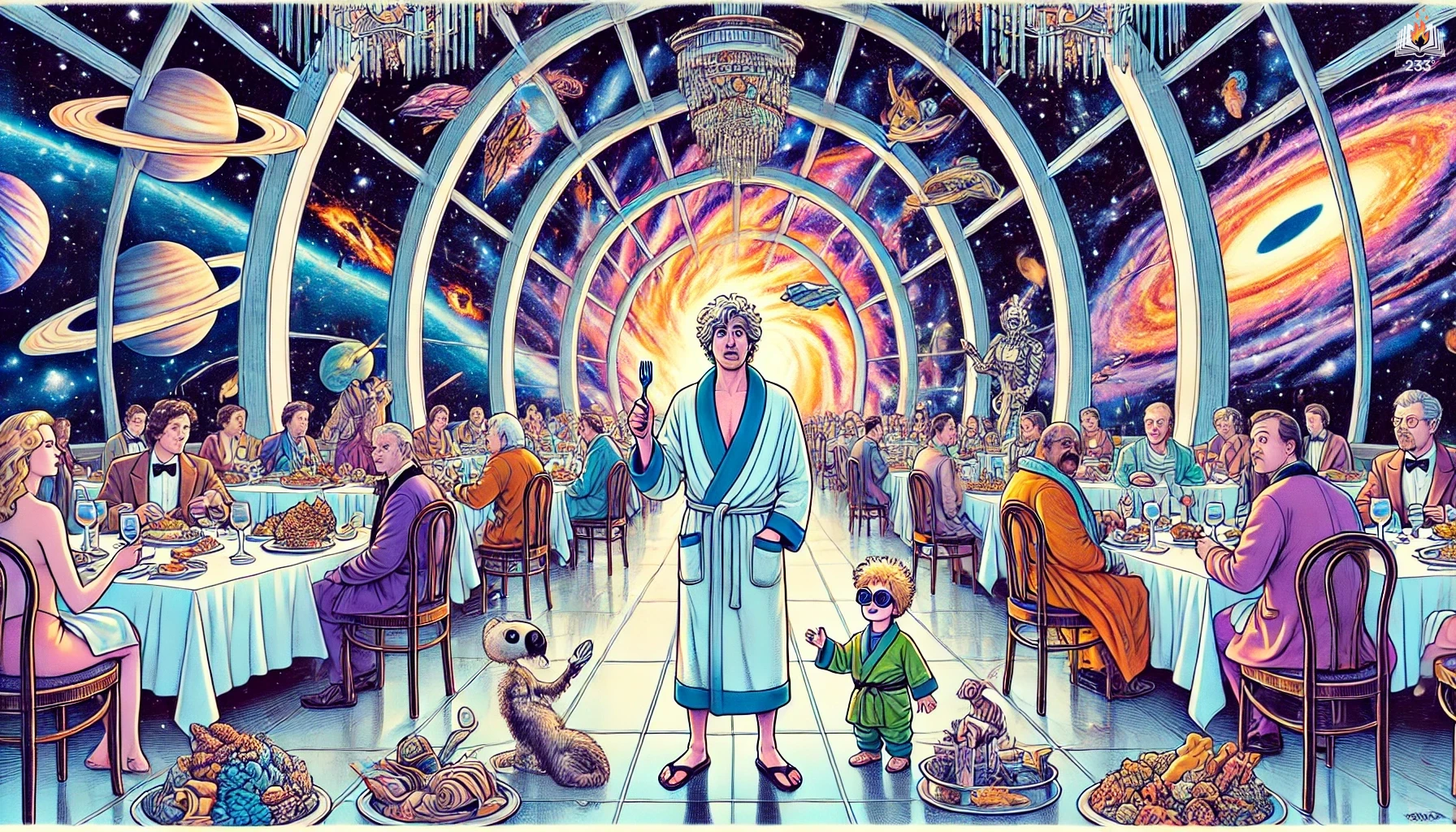Ender in Exile, published in 2008 by Orson Scott Card, is part of the acclaimed Ender’s Game series, bridging the gap between the original novel and its sequels. Set after Ender Wiggin’s devastating victory over the alien Formics, the novel follows his journey as a teenage governor of a distant human colony, grappling with guilt, political intrigue, and the search for redemption. Card revisits familiar ground while adding layers to his richly imagined universe, connecting threads from both the Ender and Shadow series.
Plot Summary
The stars stretched like a sea of quiet witnesses as Ender Wiggin, once the celebrated savior of humanity, embarked on his journey into exile. The war was over, the Formics destroyed, but the cost weighed heavy on Ender’s young shoulders. At just twelve, he carried a burden few adults could bear – the weight of a genocide disguised as victory. Earth’s leaders, eager to elevate him as a symbol of triumph, instead decided it was safer to send him away, to govern a distant colony, far from the grasp of politics and the gaze of the public.
Ender’s sister, Valentine, boarded the ship with him, her presence a fragile thread connecting him to the family he left behind. Where Ender was thoughtful and guilt-ridden, Valentine was fierce and protective, a writer whose words had quietly shaped Earth’s political tides under the pseudonym Demosthenes. Together, they sailed toward Shakespeare Colony, where Ender was to serve as governor and perhaps, in the quiet of an alien world, begin to find peace.
But peace was never simple. On the voyage, Ender encountered conflict that mirrored the manipulations of his past. A bitter captain resented the presence of a boy with authority over him, creating tension that simmered below the surface. Ender, sharp in mind yet aching in spirit, navigated the crew’s hostility with the same quiet precision that once won wars. Yet it was not conquest he sought here, but understanding – a chance to govern without bloodshed, to build rather than destroy.
As the ship approached its destination, Ender reached into the archives of his heart, composing letters to his parents and to his brother, Peter, the political genius whose shadow loomed across Earth. Peter, who had shaped nations from the safety of anonymity, yearned to use Ender’s name as leverage, his ambition as vast as Ender’s desire to disappear. But the distance between Earth and the colonies was more than physical – it was the space between hunger for power and longing for atonement.
Upon arrival, Shakespeare Colony unfolded as a fragile settlement on the edge of survival, its people wary, their eyes fixed on the boy who had come to lead them. Ender embraced the role with unexpected grace, shaping policies and settling disputes, yet always conscious of the deeper silence that called to him from the alien soil. The weight of the Formics lingered in his mind, not as a triumph, but as a wound. He dreamed not of buildings and farms, but of the last hive queen, hidden and waiting, the last hope of a species he had erased.
While Ender worked to build harmony, across space another drama unfolded. Virlomi, a Battle School veteran turned governor of Ganges Colony, wrestled with ambition and survival. Fierce and determined, Virlomi navigated the dangerous waters of colonial politics, where power was as fragile as the ships that linked them to Earth. Meanwhile, Achilles Flandres, or rather, Randall Firth – son of the treacherous Achilles – arrived as a storm cloaked in charm. His intentions were masked, his hunger for control simmering beneath a pleasant facade. As tension rose, Ender knew that the battles of the past had only changed shape. War no longer roared across starfields; it whispered in council chambers and between clenched smiles.
On Shakespeare, Ender formed a quiet bond with Abra, a boy full of wonder, eager to stand in the shadow of the great commander. In Abra, Ender saw the innocence he had long lost, the ache of what might have been. Their friendship became a quiet balm, a reminder that leadership could be more than manipulation, that trust and loyalty might mend what strategy had once torn.
Yet the greatest discovery waited beyond the human settlements. Ender, drawn by instinct and haunted dreams, found it – the cocoon of the last hive queen, hidden in the alien soil, pulsating with fragile life. Here was the answer to his restless guilt, the possibility of redemption not through apology, but through protection. The queen, through memory and alien connection, revealed her story, and in the silence between them, Ender understood that annihilation had been a failure of communication, a collapse of understanding between species. Now, carrying the cocoon, Ender became not the destroyer of a race, but its secret guardian.
Letters from home carried the weight of change. Peter’s ambitions unfolded like a web across Earth, his rise to power inevitable, his voice now public. Valentine, torn between her love for Ender and the pull of history, chose to remain with her brother, chronicling his journey, shaping the tale of a boy whose victories were carved from sacrifice. Together, they faced a truth larger than any colony or council: that their choices would echo across worlds, shaping futures neither could fully see.
On Ganges, Randall’s ambitions ignited conflict. Virlomi, sharp as a blade, confronted his schemes with the precision of a warrior, yet it was Ender’s arrival that shifted the balance. In a confrontation marked not by swords, but by words and insight, Ender dismantled Randall’s plots, exposing his hunger for domination. It was a victory without war, a triumph not of armies, but of understanding – the very thing Ender had long sought.
As the colonies settled into uneasy peace, Ender prepared for his next journey. With Valentine by his side, he set course for a life shaped not by orders or battles, but by the quiet, fierce determination to protect the last living remnant of a people once feared and misunderstood. Together, they sailed across the stars, not as conquerors, but as caretakers, seekers of redemption in the vast silence between worlds.
The stars above shimmered with the promise of new beginnings. Ender Wiggin, once a weapon shaped for war, now carried the fragile hope of rebirth cradled in his hands. His exile, once a punishment, became a pilgrimage – a path toward healing, not just for himself, but for the universe he had both saved and scarred. In the quiet hum of the ship and the whisper of distant galaxies, the boy who ended a war became the boy who dreamed of peace.
Main Characters
Ender Wiggin: Once a child prodigy and military commander, Ender now wrestles with the burden of his past actions, especially his role in the xenocide of the Formic race. His intelligence and strategic mind are tempered by deep introspection and guilt, propelling his quest for atonement as he governs the Shakespeare Colony.
Valentine Wiggin: Ender’s compassionate and intellectually gifted sister, Valentine serves as his confidante and emotional anchor. She balances her own ambitions as a writer and historian with her unwavering loyalty to Ender, offering both support and challenge to his moral struggles.
Virlomi: A brilliant and politically savvy former Battle School graduate, Virlomi becomes the governor of another colony. She is fiercely proud and pragmatic, wrestling with the consequences of power, her past as a revolutionary, and the complex political tensions with Ender.
Achilles (Randall Firth): The cunning and manipulative son of a notorious antagonist from the Shadow series, Achilles represents a new threat. His ambition and psychological gamesmanship drive a dangerous conflict on Ganges Colony, forcing Ender into another battle of wits.
Abra: A young boy on the colony who idolizes Ender, Abra represents innocence and curiosity. His evolving relationship with Ender highlights themes of mentorship, loyalty, and the lingering scars of war.
Theme
Guilt and Redemption: Ender’s internal battle with guilt over the annihilation of the Formics permeates the novel. His drive to find the last surviving hive queen cocoon and his role as a peacemaker reflect his longing for forgiveness and redemption.
Exile and Belonging: The title underscores a central tension – Ender’s physical and emotional exile. Stripped of a home on Earth and burdened by fame, he must navigate alien worlds and relationships to find a sense of belonging.
Power and Leadership: Leadership is depicted as both a burden and a test of character. Ender, Virlomi, and Peter Wiggin (offstage but influential) grapple with the costs of command, ethical responsibility, and the temptation of authority.
Identity and Transformation: The characters wrestle with who they are in the aftermath of war and conquest. Ender transforms from soldier to governor, Virlomi from revolutionary to ruler, and Valentine from sister to chronicler, each searching for their true self in a reshaped universe.
Writing Style and Tone
Orson Scott Card’s writing in Ender in Exile blends sharp, intimate psychological portraits with sweeping political and philosophical reflections. His prose is accessible yet layered, shifting fluidly between personal introspection, tense dialogue, and action-driven scenes. Card excels at internal monologue, particularly in capturing Ender’s conflicted emotions, and uses multiple perspectives to explore contrasting moral viewpoints.
The tone is reflective, often somber, tinged with irony and melancholy as characters face the aftermath of war and the complexity of rebuilding lives. Yet amid the gravitas, Card weaves moments of tenderness, humor, and human connection, particularly in Ender’s interactions with Valentine and Abra. The overall atmosphere is one of transition—between childhood and adulthood, war and peace, isolation and belonging—infusing the novel with both weight and hope.
We hope this summary has sparked your interest and would appreciate you following Celsius 233 on social media:
There’s a treasure trove of other fascinating book summaries waiting for you. Check out our collection of stories that inspire, thrill, and provoke thought, just like this one by checking out the Book Shelf or the Library
Remember, while our summaries capture the essence, they can never replace the full experience of reading the book. If this summary intrigued you, consider diving into the complete story – buy the book and immerse yourself in the author’s original work.
If you want to request a book summary, click here.
When Saurabh is not working/watching football/reading books/traveling, you can reach him via Twitter/X, LinkedIn, or Threads
Restart reading!








